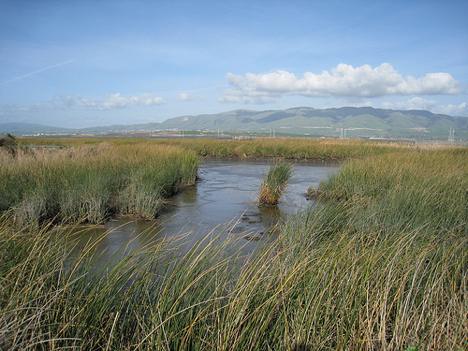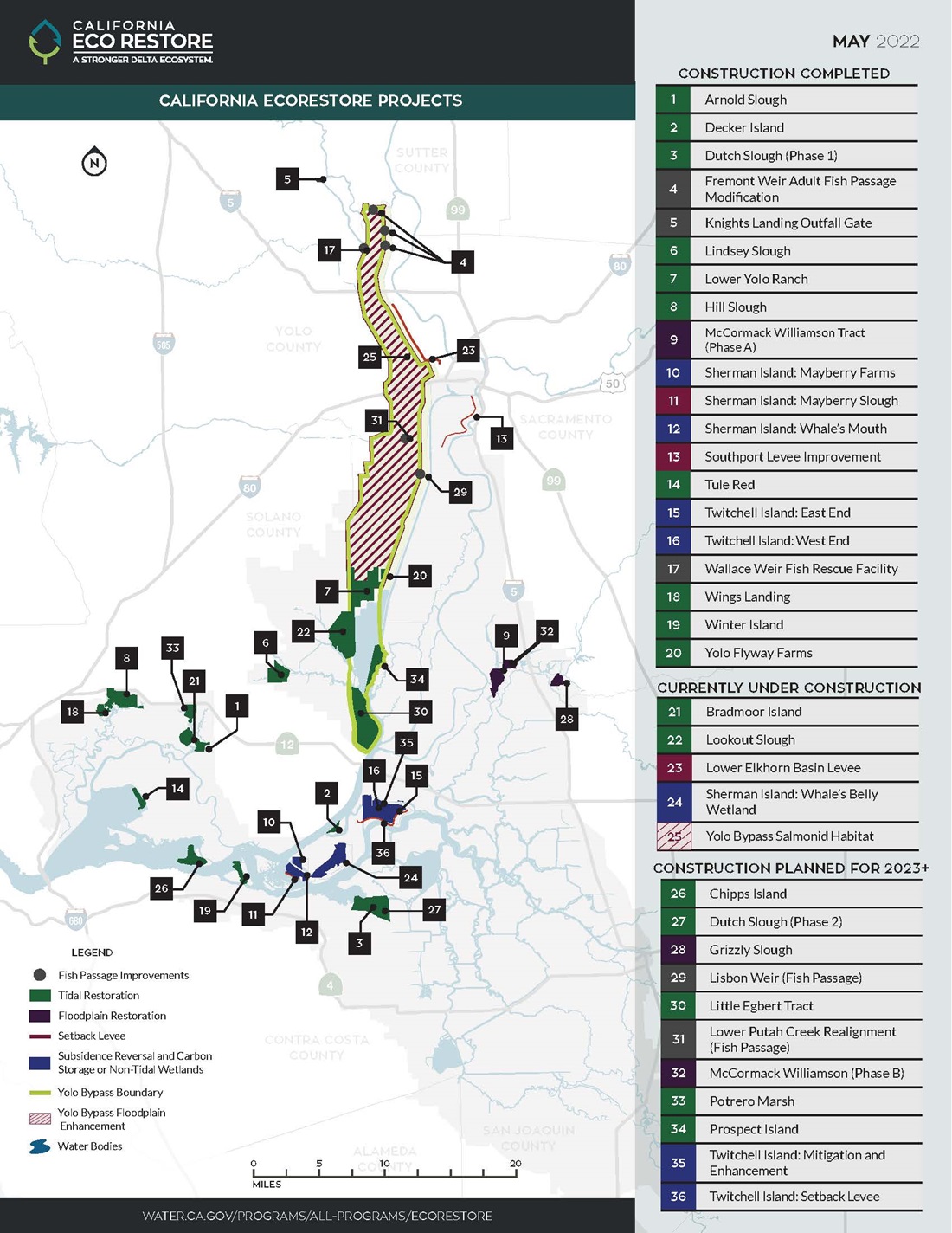From June 23 to July 14, 2022, DWR and partners celebrated four multi-benefit restoration projects taking place in California’s Central Valley including the Sacramento-San Joaquin Delta (Delta), Suisun Marsh, and Yolo Bypass region.
California EcoRestore

Tules sway in the breeze at the Dutch Slough in the Sacramento-San Joaquin Delta
California EcoRestore (EcoRestore) is a multi-agency initiative launched in 2015 to advance at least 30,000 acres of critical habitat restoration and enhancement in California’s Central Valley including the Sacramento-San Joaquin Delta (Delta), Suisun Marsh, and Yolo Bypass region. EcoRestore and its partners pursue complex multi-benefit habitat restoration projects to deliver results. The EcoRestore initiative was built on the assertion that cutting-edge science, strong partnerships, and a healthy impatience could drive more restoration than had ever been pursued in the Delta.
The Department of Water Resources (DWR) is a lead partner on a majority of projects focused on implementing a comprehensive suite of habitat restoration actions to support the long-term health of the Delta and its native fish and wildlife species. After five years of work, DWR and its partners are within reach of doubling the Delta’s restored and protected habitat lands. Our EcoRestore 5-Year Highlights fact sheet shows just how far we’ve come and gives a glimpse of what’s ahead.
Currently, EcoRestore includes 32 projects representing an investment of nearly $500 million to date. EcoRestore projects are funded by multiple sources, including the State Water Contractors through operation of the State Water Project, and funding allocated to restoration, multi-benefit, and flood needs through bonds, propositions, general fund, and other special funds. The overall estimated cost to complete the current list of 32 EcoRestore projects is $750-$950 million with approximately half from the State Water Project and half from other funding sources.
Specifically, the program aims to achieve:

Please contact Charlotte.Biggs@water.ca.gov if you have any issues accessing the map below.

Delta Tidal Habitat Restoration Projects
- Decker Island Tidal Habitat Restoration Project
- Lookout Slough Tidal Habitat and Flood Improvement Project
- Prospect Island Tidal Habitat Restoration Project
- Winter Island Tidal Habitat Restoration Project
- Yolo Flyway Farms Tidal Habitat Restoration Project
Suisun Marsh Tidal Habitat Restoration Projects
- Arnold Slough Tidal Habitat Restoration Project
- Bradmoor Island Tidal Habitat Restoration Project
- Chipps Island Tidal Habitat Restoration Project
- Hill Slough Tidal Habitat Restoration Project
- Tule Red Tidal Habitat Restoration Project
- Wings Landing Tidal Habitat Restoration Project
Yolo Bypass Habitat Restoration Projects
- Agricultural Road Crossing 4 Fish Passage Project
- Fremont Weir Adult Fish Passage Modification Project
- Lisbon Weir Fish Passage Project
- Lower Putah Creek Restoration Project
- Wallace Weir Adult Fish Rescue Facility
- Yolo Bypass Salmonid Habitat Restoration and Fish Passage Project
Delta Ecosystem Enhancement Projects
- Dutch Slough Tidal Habitat Restoration Project
- Twitchell Island Projects
- Sherman Island Projects
North Delta and Yolo Bypass Multi-Benefit Flood Improvement and Habitat Restoration Projects
Driven by the best available science, California EcoRestore efforts have advanced through various stages of planning, permitting, and construction. As California EcoRestore celebrates it first 5 years in action, the initiative is on track to exceed initial targets.
*Please contact Charlotte.Biggs@water.ca.gov if you have any issues accessing the image below.
Dutch Slough Tidal Habitat Restoration Project
Lower Yolo Ranch Tidal Habitat Restoration
Winter Island Tidal Habitat Restoration
Restoring California's Great Estuary
Dutch Slough Tidal Habitat Restoration
Fremont Weir Adult Fish Passage Project
Decker Island Tidal Habitat Restoration
McCormack Williamson Tract Floodplain and Tidal Habitat Restoration
To achieve its goal of accelerating Delta habitat restoration, California EcoRestore has encouraged developing new project delivery models, addressing long-standing implementation barriers, and building new partnerships. California EcoRestore embraces partnerships that share a vested interest in the Delta’s health and vitality, which includes supporting public safety and the local economy. Key partners include:
- State and federal Water Project Contractors
- State, federal, and local government agencies and special districts
- Local Reclamation Districts
- Non-governmental organizations and non-profits
- Private sector and land owners
Costs for California EcoRestore projects are expected to reach $500 million in the first five years.
Many efforts are funding by the state and federal public water agencies currently required to mitigate for long term operations of the State Water Project and Central Valley Project.
Funding for habitat enhancements unassociated with mitigation will come primarily from Propositions 1, 1E, 68 and 84; the AB 32 Greenhouse Gas Reduction Fund; and local, federal, and private investment.
Ensuring long term function of habitat restoration efforts is a key component of the California EcoRestore initiative.
Adaptive management emphasizes using science and monitoring to support management of natural resources under changing conditions. In the face of uncertainty, there is widespread support for using adaptive management in the Delta region to achieve ecosystem restoration goals and increase restoration success. Adaptive management is required for compliance with multiple regulatory processes, such as consistency with the Delta Plan and the Suisun Marsh Plan.
Interagency Adaptive Management Integration Team
To develop a comprehensive, science-based adaptive management approach to support achievement of Delta conservation goals, the Delta Science Program initiated the Interagency Adaptive Management Integration Team in 2016. This team serves as a technical coordinating body to strengthen interagency collaboration, and provides resources, input, and guidance on adaptive management for current and future Delta conservation efforts. It is comprised of scientific and technical staff from federal, state, and local agencies, other interagency programs and workgroups, universities, and NGOs that plan, facilitate, implement, fund, or regulate habitat restoration projects in the Delta and Suisun Marsh.
Current participants include:
- Delta Conservancy
- Delta Counties (Contra Costa, Solano, Sacramento, and Yolo)
- Delta Stewardship Council
- CA Department of Fish and Wildlife
- CA Department of Water Resources
- NOAA National Marine Fisheries Service
- NOAA Fisheries Science Center
- NGO Representatives
- San Joaquin Council of Governments
- State and Federal Water Contractors Agency
- State Water Resource Control Board
- University of California Davis
- US Bureau of Reclamation
- US Fish and Wildlife Service
- US Geological Survey
For more information, please contact Karen Kayfetz (Karen.Kayfetz@deltacouncil.ca.gov) of the Delta Stewardship Council.
Contact EcoRestore
Charlotte Biggs
charlotte.biggs@water.ca.gov
EcoRestore Updates
On March 14, 2022, the Department of Water Resources certified the Environmental Impact Report (EIR), approved the Lower Deer Creek Flood and Ecosystem Improvement Project, and filed a Notice of Determination (NOD).
As part of an ongoing effort to protect and restore critical habitat in the Sacramento-San Joaquin Delta, DWR has restored more than half of the 1,187 acres of former grazing and dairy lands into rich habitat for fish and wildlife as part of the Dutch Slough Tidal Marsh Restoration Project.
Native fish, including smelt and salmon, in the southern Yolo Bypass in Yolo County have new sources of food and shelter thanks to a project that successfully restored more than 1,600 acres of former cattle pasture.
DWR is working to reduce flood risks for more than a half million people in the Sacramento region as part of the first multi-benefit flood management and habitat project under the Central Valley Flood Protection Plan.
DWR has moved one step closer to starting construction on the Delta’s largest multi-benefit tidal restoration and flood improvement project – Lookout Slough.
The Fremont Weir Adult Fish Passage Modification Project, which began modified operations in January of 2019, has successfully allowed thousands of migrating fish to pass between the Sacramento River and Yolo Bypass in its first year of operations.
